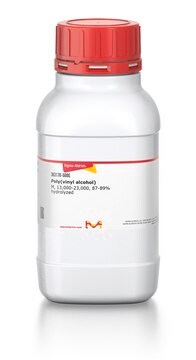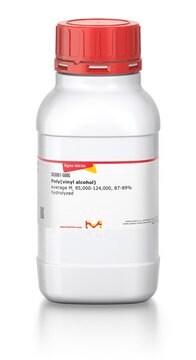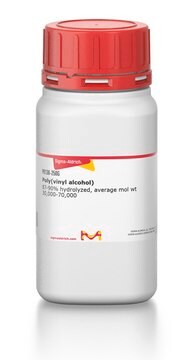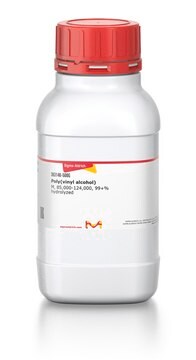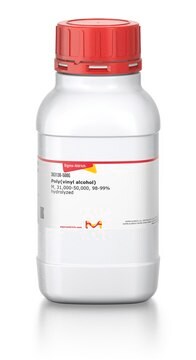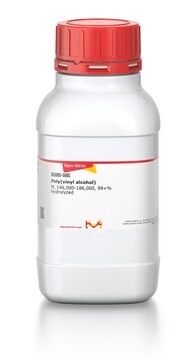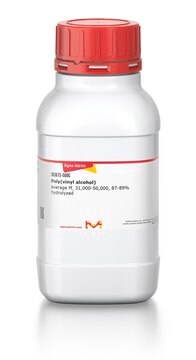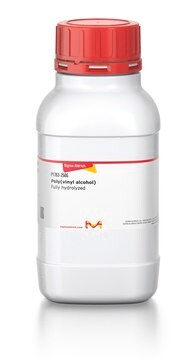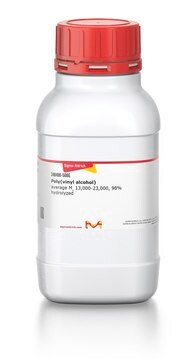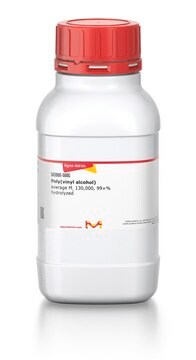360627
Poly(vinyl alcohol)
Mw 9,000-10,000, 80% hydrolyzed
Synonym(s):
PAA
Sign Into View Organizational & Contract Pricing
All Photos(2)
About This Item
Linear Formula:
[-CH2CHOH-]n
CAS Number:
MDL number:
UNSPSC Code:
12352104
NACRES:
NA.23
Recommended Products
Quality Level
form
crystals
mol wt
Mw 9,000-10,000
falling ball
2.5-3.5 cP, 4 % in H2O(20 °C)(lit.)
mp
250 °C (482 °F)
density
1.19-1.31 g/cm3
application(s)
advanced drug delivery
filtration
SMILES string
C=CO
InChI
1S/C2H4O/c1-2-3/h2-3H,1H2
InChI key
IMROMDMJAWUWLK-UHFFFAOYSA-N
Looking for similar products? Visit Product Comparison Guide
Related Categories
General description
PVA is a water soluble biocompatible polymer. It minimizes protein adsorption on its surface due to steric stabilization effect, unique solution properties and molecular conformation in aqueous form. The steric repulsion occurs due to osmotic pressure and elastic restoring forces competing with the van der Waal′s attraction between water soluble polymers and protein.
Application
PVA is used:
- In the cell collection medium for determining cellular function of mouse oocytes and eggs cells.
- As a coating and stabilizer in the preparation of drug loaded microparticles.
- In the preparation of biocompatible polymer blends of chitosan and poly (vinyl) alcohol.
- In the synthesis of bioactive polymer blends of poly(lactic acid)/poly(vinyl-alcohol)-chitosan.
- In developing chitosan-polyvinyl alcohol-bioactive glass composite membranes.
Storage Class Code
11 - Combustible Solids
WGK
WGK 1
Flash Point(F)
No data available
Flash Point(C)
No data available
Personal Protective Equipment
dust mask type N95 (US), Eyeshields, Gloves
Choose from one of the most recent versions:
Already Own This Product?
Find documentation for the products that you have recently purchased in the Document Library.
Customers Also Viewed
Ezequiel de Souza Costa-Júnior et al.
Journal of materials science. Materials in medicine, 20(2), 553-561 (2008-11-07)
In the present work we report the synthesis, characterization, and preliminary biocompatibility of polymer blends based on Chitosan and poly(vinyl alcohol) (PVA) with low degree of hydrolysis and chemically crosslinked by glutaraldehyde for potential application on skin tissue repairing. The
Preparation and characterization of chitosan/poly(vinyl alcohol) chemically crosslinked blends for biomedical applications
Ezequiel S. Costa-Junior, et al.
Carbohydrate Polymers, 76(3) null
Low protein adsorption biomaterials from polymer blends
Ding YS and Qin C
SPE/ANTEC 1996 Proceedings null
Ternary melt blends of poly(lactic acid)/poly(vinyl alcohol)-chitosan
Grande R, et al.
Industrial Crops and Products (2015)
Luisa L S Dias et al.
Biomatter, 1(1), 114-119 (2011-07-01)
The tissue engineering strategy is a new approach for the regeneration of cementum, which is essential for the regeneration of the periodontal tissue. This strategy involves the cell cultures present in this tissue, called cementoblasts, and located on an appropriate
Our team of scientists has experience in all areas of research including Life Science, Material Science, Chemical Synthesis, Chromatography, Analytical and many others.
Contact Technical Service
